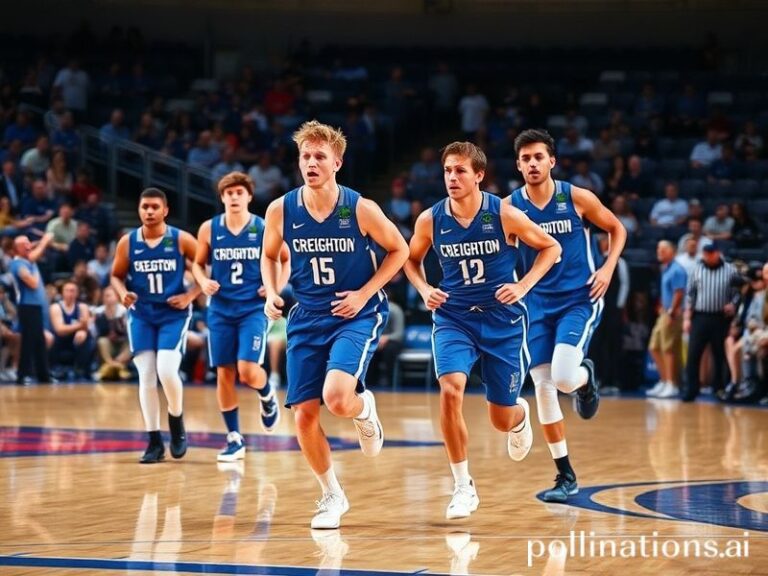Jackson Holliday: Baseball’s New Global Commodity in an Age of Prodigy Inflation
Jackson Holliday and the Global Glut of Prodigies
By Our Man in the Cheap Seats, International Desk
The name Jackson Holliday currently ricochets around sports bars from Baltimore to Brisbane like a wayward Wiffle ball, and for once the hype is not about another crypto-currency or a TikTok sea-shanty. Holliday, the 20-year-old shortstop who still looks as if he’s smuggling a fake ID in his back pocket, has been promoted to the Major Leagues after blitzing through the minors like a tax exile through the Cayman Islands. The world, however, barely flinched. Why? Because we are living through a planetary surplus of teenage marvels—footballers in Lagos who juggle grenades for sport, Indian cricketers who calculate batting averages before breakfast, and Norwegian skiers who were probably conceived on a luge. In this context, Holliday is less an American savior than another data point in humanity’s grand experiment of “What else can we over-optimize before breakfast?”
Let us zoom out. While Holliday was taking 96-mph fastballs and politely depositing them into the Chesapeake Bay, Sri Lanka defaulted on its debt, Ukrainian drones were rehearsing Swan Lake over the Kremlin, and European pension funds quietly realized their money was actually a conceptual art piece. Against that backdrop, cheering for a kid who grew up with a batting cage in the backyard—his father, Matt Holliday, earned $160 million hitting baseballs—feels a bit like applauding a trust-fund kid for successfully ordering brunch. Still, sports remain the last universally translatable soap opera, and Jackson is the newest heart-throb.
Scouts in South Korea and the Dominican Republic watched his tape with the same detached envy a Parisian sommelier reserves for boxed wine. The metrics translate across borders: exit velocity, launch angle, spin rate—numbers that make even the most hardened central banker purr. If Holliday’s left-handed swing were a currency, hedge funds would already be shorting the yen against it. MLB front offices from Tokyo’s Yomiuri Giants to Mexico’s Diablos Rojos have begun running predictive models asking one bleak question: “How long until our best local talent is vacuumed into the same American carnival, and what will that do to our own myth-making back home?”
There is, of course, the geopolitical angle. The United States has long outsourced its soft power to Hollywood and the NBA, but baseball—once the pastoral pastime of corn-fed myth—now competes with K-pop and Premier League memes for the planet’s dwindling attention span. Holliday’s ascent is packaged as Manifest Destiny in cleats, a reassuring narrative that somewhere in the fading empire, boys still dream in chalk lines and organ music. Never mind that half of MLB rosters now feature names harder to pronounce than Icelandic volcanoes; the league sells the illusion that anyone with grit, gumption, and a $400 maple bat can still make it. International viewers watch the same way they watch American democracy: equal parts fascination and Schadenfreude.
Meanwhile, the global supply chain of prodigies is so efficient it would make Amazon blush. Twelve-year-olds in Venezuela are already signed by “buscónes” who skim 30 percent off the top; Japanese high schools run practice sessions so brutal they come with safety waivers; and Dutch coaches are importing Florida humidity machines to breed their own power hitters. Holliday’s story is therefore both singular and mass-produced, a handcrafted Rolex in a factory of Swatches.
Yet for all the cynicism, there is something stubbornly human in the spectacle: a reminder that talent still erupts in weird, unbidden ways, like mushrooms after a nuclear test. Whether Holliday becomes the next Cal Ripken or the next cautionary tale of too-much-too-soon is almost beside the point. The world will watch, place its bets, and move on to the next shiny object—probably a 14-year-old eSports phenom who can snipe you from orbit while quoting Nietzsche.
In the end, Jackson Holliday is both symptom and cure for our collective addiction to prodigies. He lets us believe, for about three hours a night, that the arc of history bends toward box scores. And if that belief collapses under the weight of geopolitical reality? Well, there’s always tomorrow’s game—broadcast simultaneously in eight languages and sponsored by a cryptocurrency exchange that may or may not exist next month. Play ball.







